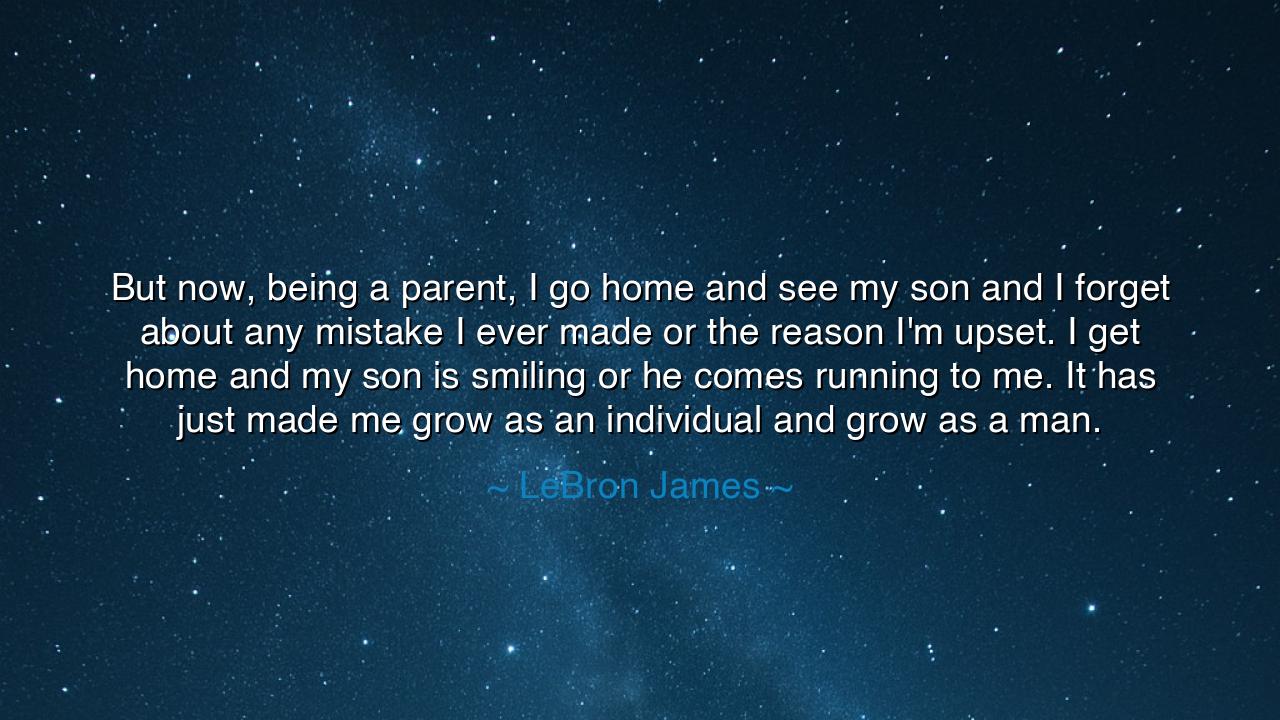
But now, being a parent, I go home and see my son and I forget
But now, being a parent, I go home and see my son and I forget about any mistake I ever made or the reason I'm upset. I get home and my son is smiling or he comes running to me. It has just made me grow as an individual and grow as a man.






In the humble confession of LeBron James—“But now, being a parent, I go home and see my son and I forget about any mistake I ever made or the reason I’m upset… he is smiling, he comes running to me… it has made me grow as an individual and grow as a man”—we hear the old music of transformation. The arena roars, the critics tally, the mind replays the errant pass. Yet a door opens, a small face brightens like a lamp, and all the clangor dissolves. The heart learns what the ancients knew: that the truest victory is not over an opponent, but over one’s turmoil, and that the surest coach is often a child who does not know he is coaching.
To be a parent is to step into a temple where ordinary gestures are sacraments. The smiling child consecrates the evening; the small feet running re-time the pulse. In such moments, the adult’s ledger—mistake and merit, praise and upset—is briefly closed, and a deeper arithmetic begins. This is not escapism; it is alignment. The soul remembers its scale: games are chapters, kinship is the book. The house becomes a school where humility and patience are taught by a teacher who mispronounces your name and loves you perfectly.
The origin of this wisdom lies in the oldest covenant: life begetting life, strength bending low to lift the tender. The athlete who commands timeouts discovers a truer clock in the bedtime routine; the star who signs autographs learns to sign permission slips; the public figure becomes a private caretaker, and the public triumphs are reframed by private joys. Thus LeBron James, forged by arenas, confesses that the definitive practice happens by the doorway where a son shouts “Dad!” and everything false in the day retreats.
History offers witness. Consider Marcus Aurelius, emperor and philosopher, whose Meditations return again and again to the discipline of returning to what is essential—justice, self-command, kindness. He writes of being steadied by the simple virtues he admired in his family: patience from one, cheerfulness from another, modesty from a third. Though imperial burdens dwarfed any upset of a lost game, he, too, found refuge and reform in the domestic sphere. The home did not distract him from duty; it refined his manner of doing it. So also here: the parent who receives a child’s smiling welcome is reminded how to wear strength without sharpness.
There is a second tale—quieter, modern. A player drops the decisive shot, hears the hiss of a stadium’s disappointment, and walks beneath the weight of replay. But at home, the toddler thrusts up a crayon masterpiece: a lopsided figure with impossibly long arms labeled “My hero.” In that absurd grace, the parent discovers the right to begin again. The next morning’s practice is different: not fueled by fury, but by fidelity. This is what it means to grow as an individual—to have one’s craft purified by one’s calling—and to grow as a man—to let tenderness instruct power.
From this, carve a lesson to pass down like heirloom steel: let your identity be anchored where applause cannot reach and criticism cannot corrode. If you are a parent, accept the discipline of delight: kneel when the child runs, listen when the house is loud with small stories, let the smiling face edit your priorities. Even without children, seek the places that reset your worth—elders, friends, service—where you are valued for presence more than performance. The home, broadly understood, is a forge for character.
Take practical steps. (1) Establish a “threshold ritual”: before you go home, breathe, name the day’s chief mistake, release it, and enter ready to receive. (2) Give ten undivided minutes on arrival—phone away, eyes soft—so that smiling and running meet a whole person. (3) Keep a gratitude ledger with your family: three lines each night, spoken aloud. (4) Let a child’s calendar mark yours: attend, coach, or simply watch; convert some ambitions into availability. (5) On hard days, serve someone weaker than you—read, wash, carry—so that strength relearns its purpose.
At last, hear the cadence beneath the quote: greatness is not a ladder climbed alone; it is a mantle worn gently for those who lean on you. The court ends at the buzzer; the calling begins at the latch of the home. When the son laughs, the spirit remembers: you were made not only to excel, but to embrace. Win or lose, let love reset the scoreboard—then return to your work clean-hearted, steadied, and worthy of the name you are called when little feet come running.






AAdministratorAdministrator
Welcome, honored guests. Please leave a comment, we will respond soon